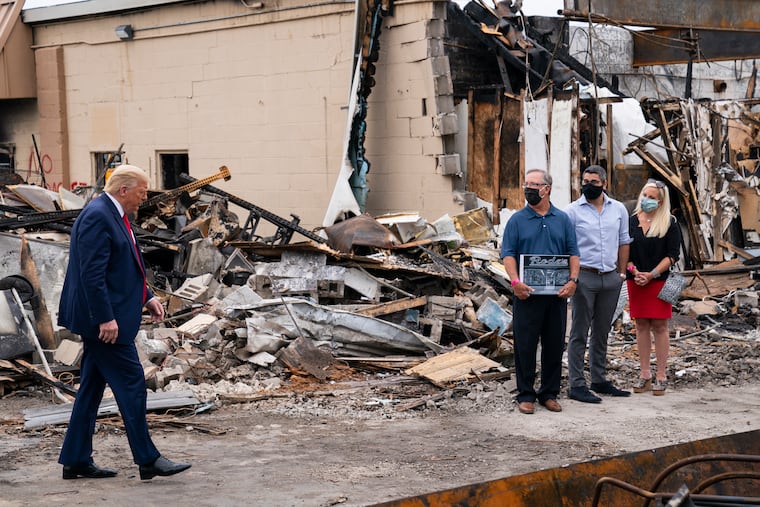Trump dodges systemic racism 4 years after telling Philly’s Black voters he’s ‘not a bigot’
President Donald Trump came to Philadelphia four years ago to tell Black voters he was 'not a bigot.' Clout looks back on that, as Trump seeks a second term amid extraordinary racial strife.

President Donald Trump, visiting what the Associated Press called “the epicenter of the latest eruption over racial injustice” in America on Tuesday, was asked: “Do you believe systemic racism is a problem in this country?”
Trump, who had just toured an arson-scarred neighborhood in Kenosha, Wis., used 451 words to circumnavigate the question without answering it. He brushed aside the questioner’s context of “countless nonviolent protests” happening around the country and instead cited “violence” four times.
That’s Trump’s game plan: blame Democratic nominee Joe Biden for racial strife and outbreaks of violence and paint himself as (stop us if you’ve heard this before) the only one who can fix it.
Trump was telling a different tale four years ago this week. He came to Philadelphia for a private meeting with a dozen Black voters best described as supporters or at least Trump-curious, telling them he was “not a bigot.” Protesters outside had other ideas.
A day later Trump told the congregation of a Black church in Detroit, “I fully understand that the African American community has suffered from discrimination and that there are many wrongs that must still be made right and they will be right.”
Clout wondered how Trump’s words from that 2016 Philly meeting resonate as he runs for reelection. So we checked in with two Black pastors with ties to the event.
Pastor Todd Johnson, who attended, said he was a “skeptical” Trump supporter then. He’s all in now and insists Republican presidential candidates always get tagged as bigots by the Democratic Party.
“And to some degree it works, because they stoke those fears in people in minority communities because they don’t make them to be independent thinkers,” Johnson said this week in his North Philadelphia church.
Asked if Trump had ever said anything about race that made him uncomfortable, Johnson said, “I’ve heard him be misquoted. I’ve heard his words taken out of context.” For that, he blames “so-called fact-checkers” in the media.
» READ MORE: ‘We’re supposed to be Democrats’: Black Trump supporters in Philly on why they back the president
Trump’s campaign four years ago rented a North Broad Street catering hall run by a nonprofit controlled by Greater Exodus Baptist Church. The Rev. Herb Lusk II took pains at the time to note that providing space for the event was no endorsement and that he was undecided in the presidential election.
Lusk, a former Eagles running back who served as an adviser to former President George W. Bush and spoke at the 2000 Republican National Convention, sounds like his sentiments haven’t shifted much. He said Trump and Biden “should be reaching out to the Black voters in this country.”
“This race for president is so polarizing I choose not to add to it,” Lusk said when asked if he would vote for Trump. “My vote for president in the toxic environment will be between me and my God. I will tell you that I’m open enough to see positives and negatives in both candidates.”
A dark-money group is sending Pa. voters mail ballot applications as Trump keeps attacking mail voting
For all the trash Trump talks about voting by mail, he and his political allies sure want you to mail in your ballot for the election nine weeks from now.
A new dark-money group, Common Sense Voters of America LLC, last week sent Pennsylvania voters two unsolicited applications for mail ballots in “election guide” mailers stuffed with language that makes clear the group favors Trump over Biden.
Who did this? Who paid for it? How many mail ballot applications were sent? Were they sent to voters in other states? These are some of Clout’s questions the group refused to answer.
“I’m not authorized by my client to comment,” said Chris Finney, a Cincinnati lawyer active in Republican and conservative politics who registered the group as a nonprofit in Ohio on June 29.
The mailers list a Pennsylvania Avenue address in Washington that tracks back to a company offering “virtual office” space for tenants to show a “powerful presence” near the White House.
Trump, who votes by mail in Florida, last week railed on Twitter again about unsolicited mail ballot applications sent to voters. His central claim, which is false, is that mail ballots lead to widespread election fraud.
The mailers don’t explicitly tell voters how to vote for president. But they do ask, “Are these your Pennsylvania values,” with a photograph manipulated to look like Biden is holding news headlines saying he “supports Sanctuary Cities,” federal funding for abortions and “LGBTQ rights.”
As Clout told you in May, Trump’s reelection campaign, along with the Republican National Committee and the Pennsylvania Republican Party, have all urged voters to use mail ballots.
A Pew Research Center national poll in mid-August found a majority of Trump supporters (80%) want to vote in person on Election Day, while a majority of Biden backers (58%) want to vote by mail.
Quotable:
“They will vote and then they are going to have to check their vote by going to the poll and voting that way because if it tabulates then they won’t be able to do that. So, let them send it in and let them go vote. And if the system is as good as they say it is, then they obviously won’t be able to vote. If it isn’t tabulated, they will be able to vote.”
— President Donald Trump in North Carolina on Wednesday, suggesting his supporters should try to vote both by mail and in person.